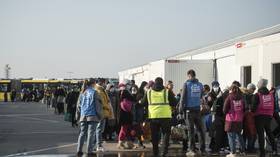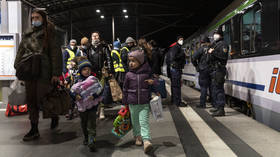Afghan refugees evicted to make room for Ukrainians – media

Afghan refugees in Berlin are being moved from their accommodation centers to make room for Ukrainians fleeing the ongoing conflict in their country, according to a recent report in Foreign Policy magazine. Those affected are shuffled to apartments, repurposed hotels and homeless shelters as authorities struggle to accommodate tens of thousands of people.
“The evictions purposefully weren’t publicized. Some people had lived in their homes for years and were ripped out of their social structures, including children who were moved to locations far from their respective schools,” Tareq Alaows, a Berlin Refugee Council board member, told the outlet.
While some of those moved were relocated to apartments of their own, others found their new homes to be less than ideal. One man was separated from his mother and two brothers while another woman found herself, her husband and two daughters relocated twice in March – once to a facility housing former criminals – before being settled in a hotel that doubled as a homeless shelter.
Germany took in around 12,000 Afghan refugees following the Taliban’s takeover last August, and reportedly planned on doubling that figure as of December. However, more than 316,000 Ukrainians have officially arrived since Russia launched its military offensive there in February, and 60,000 have been registered in Berlin alone.
Many of these most recent arrivals will be processed in the German capital before being sent to accommodation throughout Germany, but some will remain in Berlin, where space for refugees is at a premium. According to Berlin’s Senate Department for Integration, Labor, and Social Services, the city has a total of 83 different accommodations for refugees, already housing some 22,000 people.
With local authorities keen to keep Ukrainians in a few defined processing centers, finding accomodation for the Afghans pushed out is a costly enterprise. Rent in the city is now 40% more expensive than it was a year ago, after a court struck down a price control law.
According to surveys, Germans favor admitting Ukrainian refugees over Afghans and others. A poll taken last year found that 60% of respondents didn’t want their government to take in any more refugees. Even as then-Chancellor Angela Merkel announced plans to welcome tens of thousands of Afghans, Armin Laschet, the leader of Merkel’s CDU party, told voters that 2015 “must not be repeated,” referring to Merkel’s decision to welcome around a million Middle Eastern and African migrants.
However, 91% of Germans in March supported taking in refugees from Ukraine. This, combined with Poland and Hungary – normally staunch opponents of immigration – taking in hundreds of thousands of displaced Ukrainians, has prompted liberal pundits and activists to accuse European nations of applying “double standards” to refugees, depending on their country of origin.
“Of course it’s not the Ukrainians’ fault, but we have to reflect on our solidarity if it’s only targeting certain people,” Alaows insisted. “The last months showed that different treatment of refugees is possible, and this needs to be systematically anchored in our society.”













